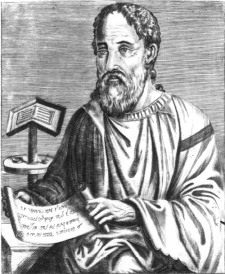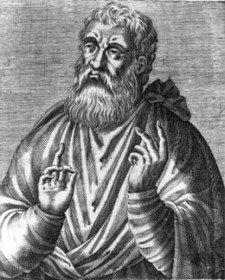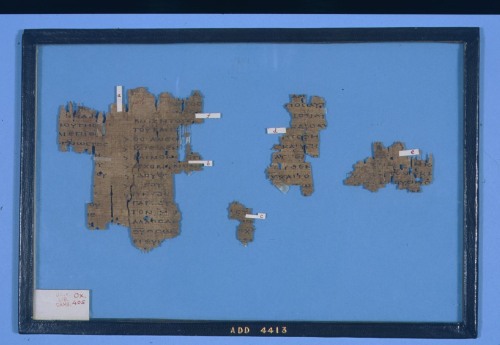Christian-History.org does not receive any personally identifiable information from the search bar below.
The Doctrine of the Trinity:
Did It Develop over Time?
I do not accept the common historical belief that the doctrine of the Trinity was developed over time and then finalized at Nicea. I hope I have already established that there is a consistency from the time of the apostles all the way through the Council of Nicea.
The study I put into these articles has resulted in a book called Decoding Nicea. Often reviewed as "interesting," it tells the story of Nicea in more detail than is possible here. Available wherever books are sold. See Amazon reviews.
Ad:
Our books consistently maintain 4-star and better ratings despite the occasional 1- and 2-star ratings from people angry because we have no respect for sacred cows.
It certainly was not finalized at Nicea. We have seen that the Nicene Creed was adapted into the Athanasian Creed which then became our modern doctrine of the Trinity. The Nicene definition of the Trinity, for the most part, is long forgotten.
However, if I am going to take a stand—and teach it on this web site—that is not accepted and popular among historians, I want to prove it thoroughly. Therefore, I want to give you plenty of evidence that the Nicene doctrine of the Trinity did not develop but is taught throughout the earliest Christian writings after the apostles.
Let's begin with Eusebius, the historian.
Eusebius of Caesarea
 Eusebius the historian
Eusebius the historianEusebius' Ecclesiastical History was written in A.D. 323 and is still published in several formats today. Many people who have not read anything else from the primitive church have read his history.
Eusebius wrote a letter after the Council of Nicea justifying its conclusions. He wrote for good reason. It was the "rule of faith" of his church, Caesarea, that was used as the basis for the Nicene Creed, and he was explaining the adaptations that the council had made.
Because that letter is written so apologetically, Eusebius' adherence to an orthodox doctrine of the Trinity is questioned.
Worse, when people read the Nicene Creed through the eyes of the modern doctrine of the Trinity, Eusebius' orthodoxy is even further questioned. As we have seen, there are places where the Nicene doctrine of the Trinity and our modern teaching conflict.
But Eusebius is possibly the best witness of the consistency of the pre-Nicene doctrine of the Trinity. His Ecclesiastical History is replete with quotes from the writers before him. In fact, much that has been lost and is unavailable today is preserved in his writings.
If the Church in its earlier days had believed anything different from Nicea, or if the doctrine of the Trinity had developed over time, no one would know better than Eusebius. However, instead of testifying to change, Eusebius defended the Nicene Creed with these words:
That he is consubstantial with the Father then simply implies, that the Son of God has no resemblance to created things, but is in every respect like the Father only who begat him; and that he is of no other substance or essence but of the Father. To which doctrine, explained in this way, it appeared right to assent, especially since we knew that some eminent bishops and learned writers among the ancients have used the term "homoousios" in their theological discourses concerning the nature of the Father and the Son. (The Ecclesiastical History of Socrates Scholasticus, ch. 8)
Here he agrees with the use of homoousios because it was used by earlier writers. We have seen on this page how Tertullian regularly refers to the substance of God in his writings. Eusebius was aware of this.
Let's become aware of that ourselves. Let's simply begin at the beginning, in the earliest of the Christian writings after the New Testament.
Anonymous Letter to Diognetus
One of the very earliest Christian writings is the anonymous letter to Diognetus. It may have been written as early as A.D. 80, though its date has been difficult to determine. Even at this early date, however, we can see the Nicene doctrine of the Trinity.
Interesting Note
The Epistle to Diognetus is the only one of the Pre-Nicene writings to quote no Scripture
Truly God himself … has sent from heaven and placed among men the truth and the holy and incomprehensible Word and has firmly established him in their hearts. He did not, as one might have imagined, send to men any servant, angel, ruler, or anyone of those who bear sway over earthly things … but the very Creator and Fashioner of all things—by whom he made the heavens. (ch. 7)
This anonymous author was not trying to explain the doctrine of the Trinity, but he leaves us several clues that he held to the Nicene faith.
- He refers to the Son as the Word, and he does so repeatedly (though you can't see it in this small quote).
- He contrasts God with the Word. He does not say the Father sent the Word, but that God did.
- Nonetheless, the Word is the Creator and Fashioner of all things
- The Word is not the Creator alone, but God created all things through him.
Ignatius and the Doctrine of the Trinity
Ignatius, one of the most important witnesses to the apostolic era, has some unusual comments in his letters. In the introduction to his letter to the Ephesians, he refers to "the will of the Father and Jesus Christ, our God."
This reference to Jesus Christ as God while the Father is being mentioned seems to be an exception to Tertullian's terminology concerning the Trinity.
I don't have any explanation for this other than that there's nothing in this terminology that violates the Nicene faith. This terminology is unique to Ignatius, who is a notable but lone exception.
He also refers to "the blood of God" in chapter one of that same letter. This sort of terminology can be found in Acts 20:28 as well.
Make no mistake, however. Ignatius' views are not an exception. Quotes like: " … in one faith of God the Father and of Jesus Christ his only-begotten Son, the first-born of every creature" are throughout his writings.
Here's another one:
He sent the Word that he might be manifested to the world … This is he who was from the beginning, who appeared as if new, and was found old, yet is ever born afresh in the hearts of the saints. This is he, who being from everlasting, is today called the Son. (ch. 11)
Justin Martyr
There are other Christian writers between the Letter to Diognetus and Justin Martyr, but none of them say anything clearly about the doctrine of the Trinity, except perhaps this quote from Clement of Rome:
The apostles have preached the Gospel to us from the Lord Jesus Christ; Jesus Christ [has done so] from God. (First Clement 42).
Justin, on the other hand, says a lot about the doctrine of the Trinity because he's having to explain to a Jew why Christians call more than one Divine Person God.
He actually makes his first mention of the Divine Logos in his letter to the emperor, referred to as First Apology. He argues that the Logos imparted wisdom to Socrates in order to allow him to correct the demon worship of the Greeks.
Not only among the Greeks did Logos prevail to condemn these things through Socrates, but also among the barbarians were they condemned by the Logos himself, who took shape, became man, and was called Jesus Christ. (ch. 5)
He is very direct in Dialogue with Trypho, a Jew
God begat before all creatures a Beginning, a certain rational power from himself, who is called by the Holy Spirit … the glory of the Lord, then the Son, again Wisdom, again an Angel, then God, and then Lord and Logos. (ch. 61)
 An artist's depiction of Justin Martyr
An artist's depiction of Justin MartyrJustin even provides illustrations of how such a begetting might have happened!
He was begotten of the Father by an act of will, just as we see happening among ourselves. For when we give out some word, we beget the word; yet not by cutting off so as to lessen the word in us … just as we see happening in the case of a fire, which is not lessened when it has kindled [another], but remains the same. And that which has been kindled by it likewise appears to exist by itself, not diminishing that from which it was kindled. (ibid.)
He then adds the typical reference to Proverbs 8:22:
The Word of Wisdom, who is himself this God begotten of the Father of all things—and Word, Wisdom, Power, and the Glory of the Begetter—will bear witness to me when he speaks by Solomon the following: " … The Lord made me the beginning of his ways for his works. From everlasting he established me in the beginning before he had made the earth." (ibid.)
Justin's belief in Jesus as the Logos of God generated in eternity past is so clear that references are made to Justin's "Logos doctrine." However, his Logos doctrine is the same one that all other well-instructed early Christians believed.
Irenaeus of Lyons
Irenaeus is another important witness to the apostolic age, having sat under the teaching of Polycarp who had been appointed bishop of Smyrna by the apostle John. Irenaeus was a missionary to barbarians in Gaul (modern France) who supervised several churches in and around Lyons.
In his famous treatise Against Heresies, he writes:
If anyone … says to us, "How then was the Son produced by the Father?" we reply to him that no one understands that production or generation … which is in fact altogether undescribable. (II:28:6)
Even more clearly, he says:
One God the Father is declared, who is above all … The Father is indeed above all, and he is the head of Christ, but the Word … is himself the head of the Church. (V:18:2)
There is one God, the Father over all, and one Word of God, who is through all, by whom all things have been made. (V:18:2)
 Papyrus Oxyrhynchus 405
Papyrus Oxyrhynchus 405an A.D. 200 manuscript from Irenaeus
Clement of Alexandria
Clement of Alexandria, not to be mistaken with Clement of Rome from a century earlier, wrote in the late 2nd century. He was a prolific writer who trained new Christians in Alexandria, Egypt.
In a discussion on 1 John (Fragments of Clement of Alexandria: Comments on the First Epistle of John from The Ante-Nicene Fathers, vol. II), Clement discusses the generation of the Son of God:
When [John] says, "from the beginning," the elder explained to this effect, that the beginning of generation is not separated from the beginning of the Creator. For when he says, "That which is from the beginning," he touches on the generation without beginning of the Son, who is co-existent with the Father. There was, then, a Word importing an unbeginning eternity, as also the Word itself, that is, the Son of God, who being by equality of substance one with the Father, is eternal and uncreated.
When [John] says, "from the beginning," the elder explained to this effect, that the beginning of generation is not separated from the beginning of the Creator. For when he says, "That which is from the beginning," he touches on the generation without beginning of the Son, who is co-existent with the Father. There was, then, a Word importing an unbeginning eternity, as also the Word itself, that is, the Son of God, who being by equality of substance one with the Father, is eternal and uncreated.
Theophilus of Antioch
Theophilus is several bishops removed from Ignatius, an earlier bishop of Antioch, writing as he did in A.D. 168.
Antioch, remember, was Paul's home church.
Theophilus also bore a very clear understanding of the doctrine of the Trinity as taught by the Nicene Creed.
The Word … always exists, residing within the heart of God. For before anything came into being, he had him as a Counselor, being his own mind and thought. But when God wished to make all that he determined , he begot his Word, uttered the first-born of all creation [Note the reference to Psalm 45:1 in the LXX], not himself being emptied of the Word, but having begotten Reason and always conversing with his Reason… . John says, "In the beginning was the Word, and the Word was with God," showing that at first God was alone, and the Word in him. (To Autolycus II:22)
You can't get a much more precise exposition of the Nicene Creed, and this was 157 years before the Council of Nicea convened to discuss the doctrine of the Trinity.
Athenagoras
Athenagoras was an apologist who wrote in A.D. 177. His Plea for the Christians is addressed to an unbelieving emperor.
In it, he writes:
We acknowledge one God, uncreated, eternal, invisible, impassable [i.e., not subject to suffering], incomprehensible, illimitable … by whom the universe has been created through his Logos … We acknowledge also a Son of God. Nor let anyone think it ridiculous that God should have a Son … the Son of God is the Logos of the Father. (ch. 10)
This is another extremely clear exposition of the doctrine of the Trinity found in the Nicene Creed, but Athenagoras, a skilled writer, is able to make it even more clear!
If … it occurs to you to inquire what is meant by the Son, I will state briefly that he is the first product of the Father, not as having been brought into existence, for from the beginning God, who is the eternal mind, had the Logos in himself, being from eternity instinct with Logos. (ibid.)
Did Athenagoras actually read the Nicene Creed?
He couldn't have, of course, but this does make you wonder whether the Nicene Council read A Plea for the Christians! And of course they did because Eusebius the historian, well familiar with Athenagoras and his letter, was at the Council of Nicea!
3rd Century Writers
There's no real need to address 3rd century quotes. Our job in this section is to establish that the doctrine of the Trinity taught in the Nicene Creed did not develop, but remained the same from the apostles to Nicea. If the 2nd century churches consistently taught the Nicene doctrine of the Trinity, then 3rd century churches—being in between the 2nd century and Nicea—did as well.
We explained the Nicene Creed earlier using Against Praxeas by Tertullian, who wrote at the beginning of the third century, so we have looked at one 3rd century writer.
I believe this is all the evidence needed to establish that the doctrine of the Trinity did not develop during the Pre-Nicene era, but that it remained the same from the apostles to the Council of Nicea.
No wonder Irenaeus was able to write:
The Church, having received this preaching and this faith, although scattered throughout the whole world, yet, as if occupying but one house, carefully preserves it. She also believes these points just as if she had one soul and one and the same heart, and she proclaims them, teaches them, and hands them down with perfect harmony, as if she possessed only one mouth. (Against Heresies I:10:2)
In Conclusion
You thought I'd never get here, didn't you?
This is very long for a web page, but I believe this is the clearest, most thorough overview of the doctrine of the Trinity in the early church on the internet—or, for that matter, even in a Christian bookstore.
- Go to Part VI: An Outline of the Nicene View
- Return to Part IV: Is the Nicene Creed Heretical?
- Or return to main Trinity page
Early Church History Newsletter
You will be notified of new articles, and I send teachings based on the pre-Nicene fathers intermittently.
When you sign up for my newsletter, your email address will not be shared. We will only use it to send you the newsletter.